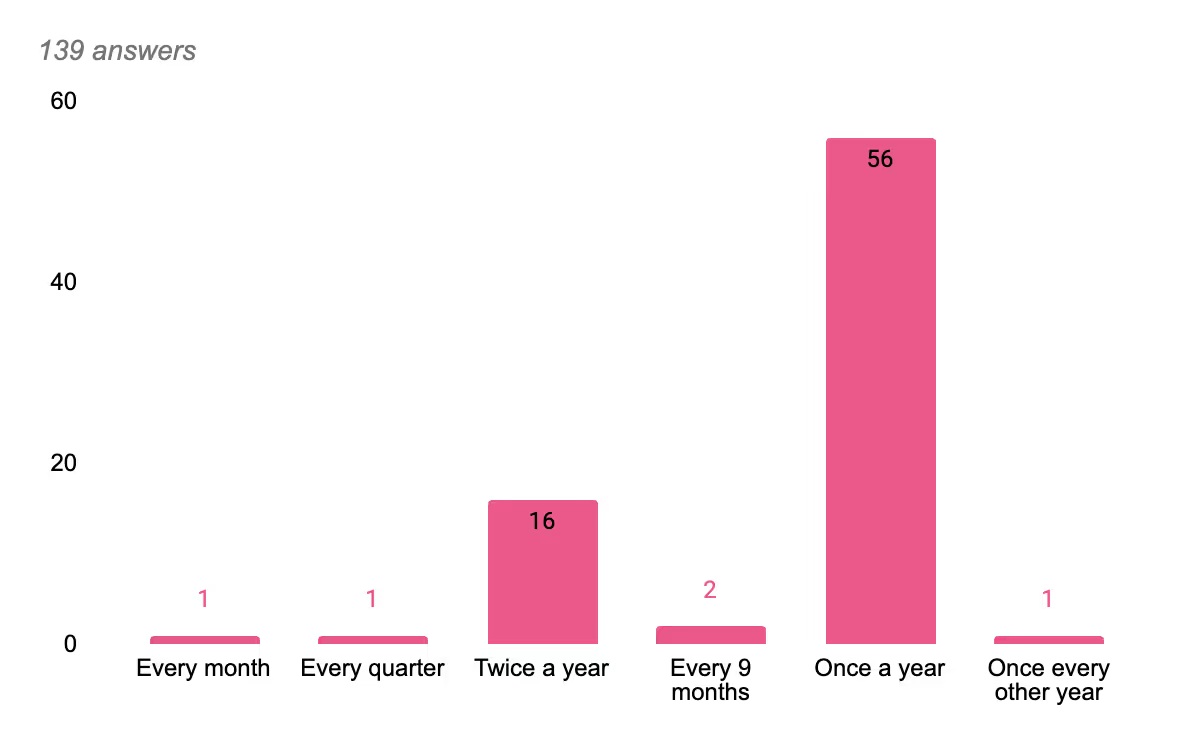How Often Should You Perform a Compensation Review?
Performing a compensation review is a huge task, which can involve several weeks of preparation. So it goes without saying that it’s probably not something you can do every month, even if you wanted to.
So, how often should you be carrying out compensation reviews? Below, we’ll share some insights from our latest compensation review survey — plus the inside scoop on how we do things at Figures.
Psst! This post is an edited excerpt from our recent report, Compensation Reviews in the Era of Pay Transparency. In it, we share insights from our latest compensation review survey, plus tips on running compensation reviews that comply with the EU pay transparency directive. Download the full guide here!
How often are other companies performing reviews?
Every company has its own specific needs and internal processes, and we can’t tell you what will work best for your organisation. But we can tell you what other companies are doing: our research shows that the majority of companies perform compensation reviews annually, with only 1% of companies saying they do them less frequently than this.


Our research clearly shows that the standard practice is still to do compensation reviews annually. However, around a quarter of organisations surveyed have either decreased or increased the frequency of their reviews.
There’s also a growing number of companies that are performing salary reviews more often — twice a year or every nine months, for example. Although this can be a lot of work, it makes sense in an economic context where things can change very quickly. In these circumstances, being more reactive to market changes can give companies an edge over their competitors when it comes to attracting and retaining talent.
Another advantage of performing compensation reviews more than once a year is that it allows room for employees who are quickly moving up the pay ladder. In the start-up/scale-up world, it’s not uncommon for rising stars to move much faster than we’re used to seeing at larger organisations. In these situations, employers that aren’t regularly reviewing their salaries risk losing their top employees to companies that are willing to pay more.
What happens if you don’t perform a compensation review every year?
Listen: we’re not saying your entire business would fall apart if you were to skip a compensation review. But over time, not performing regular reviews could have a serious impact. Here are some of the potential risks of neglecting this important process:
- Internal inequities might go unnoticed: However good your intentions are, pay inequities can always creep in. That might come in the form of a gender pay gap, or differences in pay between two employees due to salary compression. Either way, a regular compensation review is an opportunity to spot (and correct) these issues.
- You might have issues with employee morale and engagement: Running regular compensation reviews shows employees that you care about paying them fairly — but not doing so sends the opposite message. If you’re not conducting a salary review at least once a year, employees might feel that they're being underpaid, even if they’re not.
- You might be at risk of non-compliance: Your annual compensation review is the moment to make sure your pay practices are in line with any regulations about pay — like those set out in the upcoming EU pay transparency directive, for example. If you skip the review, you might not realise that your practices are no longer compliant until it’s too late to fix them.
- Your best people might leave: The most obvious result of not regularly updating your salaries to bring them in line with the market? Your employees will be able to get paid more elsewhere. It doesn’t take a genius to figure out that this could lead to a big problem with retention over time.
How we do things at Figures
We’re all about transparency here at Figures — and we don’t mind giving you a peek into our own processes. So how often do we run our compensation reviews?
Well, as of 2023, we run compensation reviews twice a year: once in May, and then again in November.
There are two main reasons for this:
1. We’re a young company, and our people are growing fast
Some members of our team are at a pretty early stage in their careers, but they’re ambitious and keen to move up. We want to make sure we have plenty of opportunities to allow those people to advance so that we can retain them for longer. Think about it: if you joined a company just a month after the annual review and had to wait almost a whole year to be eligible for a raise, that would be pretty frustrating. Running reviews twice a year ensures everyone has the opportunity to grow.
2. The market is moving quickly, and we want to make sure our pay is fair
We’re also aware that the market is pretty volatile right now, and we don’t want to lose people because we’re not keeping up with it. By reviewing and adjusting our salary bands twice a year, we can make sure that we’re always paying our team at our desired positioning — even if the market shifts.
So, what’s the verdict?
If you want our advice, we strongly recommend conducting reviews at least annually — and if you’re able to do it twice a year, that’s even better.
Even if that’s not a possibility for you, we’d still recommend adding in a mid-year review for things like promotions, edge cases and other exceptions. This ensures you’re dealing with any unusual circumstances quickly, without the huge amount of work that a full twice-yearly review represents.
The secret to smooth and effective compensation reviews
If you’ve been running your compensation reviews with a jumble of Excel sheets, you might be wondering if you can even face going through all of that twice a year. We get it.
But with Figures, running effective compensation reviews doesn’t have to give you nightmares. In fact, our new compensation review module makes it pretty close to effortless.
The best part? Figures is backed up by our database of salaries from over 1000 companies. With intuitive visuals and reliable analytics baked right into the platform, Figures gives you a solid basis for every salary decision.
Want to learn more? Book a free demo to get started.
Psst! Want more compensation insights? Download our guide, Compensation Reviews in the Era of Pay Transparency for everything you need to know to run effective, transparent pay reviews.
Summarize this article with AI
No time to read it all? Get a clear, structured, and actionable summary in one click.






